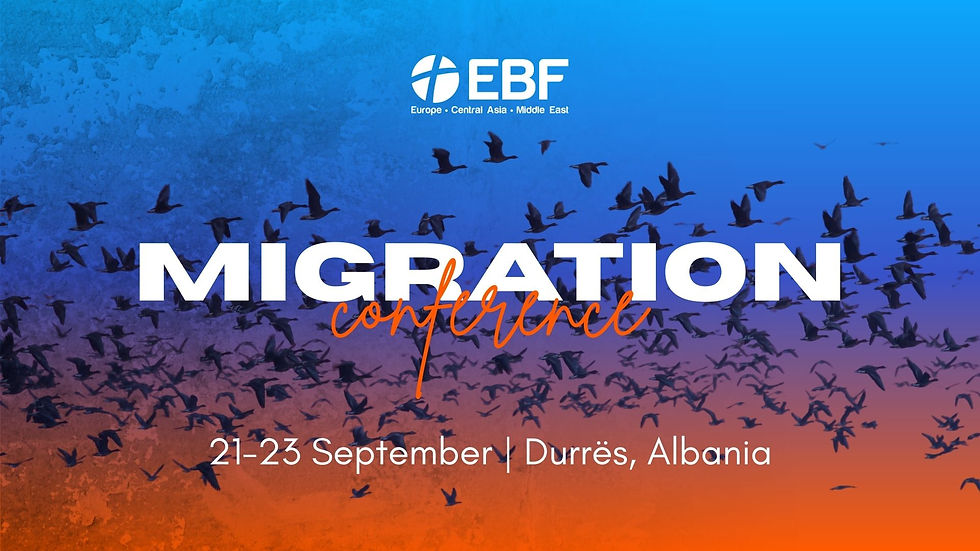How Baptist Churches in Ukraine are Responding to War
- Mar 23, 2022
- 3 min read
“Huge initiatives of practical help, prayer… and homecooked pies”

Hundreds of Ukrainian Baptist churches continue to be at the heart of relief efforts in their besieged country.
According to the updates from the All-Ukrainian Union of Churches of Evangelical Christian Baptists (UCECB), churches are involved in a range of activities including evacuation, resettlement, delivery of homecooked food and humanitarian supplies and provision of spiritual care and prayer support.
The support is taking place in some of the worst affected areas. Mariupol has been under siege for more than two weeks now, with more than 50 to 100 air bombs dropped every day. Around 350,000 residents of the port city are hiding in shelters and basements from the continuous shelling.
Oleksiy Ivanov is an elder in the Zaporizhia region. He reports the Regional Baptist Churches Association continues to evacuate people from Mariupol and bring humanitarian aid there. Food and medicine have been transported from Lviv, Lutsk and other western cities.
There is a similar activity in both Luhansk and Donetsk. Earlier this week the Church of Lysychansk in Luhansk gave out “a glass of sugar, five or six potatoes, half a loaf of bread and 500g of grits” to everyone who visited the church that day. The food is brought from the nearest cities of the Donetsk region, such as Bakhmut, Pokrovskaya, Druzhkovka.
Church deacon Stepan Kozodoy gave an insight into the practicalities of providing this: “Unfortunately, food runs out quickly, and we need to go there and back, again and again,” he said. “Lots of money is spent on fuel, for buses and generators. One of the buses breaks every now and then.
“We need help.”
Lysychansk, along with other Luhansk cities Severodonetsk and Rubizhne, are being subject to the “total destruction of civilian infrastructure and housing” as the Russian occupiers struggle to capture them. Hundreds of thousands of people, in addition to shelling, are suffering without gas, water and electricity.
In the midst of this, the Church of the Transfiguration in Severodonetsk continues to be active, evacuating families, hosting the homeless and distributing food kits to sick and elderly people in the city. The church was only established in 2016 and had previously focused its ministry on people struggling with addictions. Their activities in the war mean that “former alcoholics and drug addicts have become true heroes of the faith, preaching the gospel and hope in the Lord,” wrote the UCECB.
The shelling is a similar story in the northern city of Chernihiv. People are leaving the city not only by car but also by foot, across fields. Many personal belongings are “scattered everywhere on the road, as it was difficult to carry them,” said one of Chernihiv’s pastors.
For those who remain, the church has organised a support centre, where it bakes bread, receives people, distributes food and organises places to stay.
“We distribute more than a tonne of food every day,” the pastor added.
Churches continue to be active in the Kherson region, almost all of which is under occupation. They gather for services and joint prayer meetings, and organise help for all they can: Kherson city churches, as well as those in the towns of Olshkiv, Novokahovka and Chulakivsk, are engaged in a "huge initiative"; feeding people, finding those displaced places to live and receiving local residents in bomb shelters. Christians from the Kherson church Golgotha have been looking after children from a regional orphanage right since the start of the war.
Small churches are involved in extraordinary efforts. Take the Philadelphia Church in Ternopil, a city in western Ukraine. Despite having only 40 members, every day it receives around 100 people, many with pets, who are evacuating. It gives them food, rest and shelter in its building. In total it has helped 7,000 people, with the help of friends and partners.
Food is a vital activity in the response. The Novomoskovsk church members in the Dnipropetrovsk region bake 130 pies every day (except Sunday) which are then taken to the nearest roadblocks to feed the soldiers. Churches of the northern district of the Poltava region have been preparing “a dozen traditional, regional, delicious dishes” for the defenders.
Elsewhere life continues as best it can. In Mykolaiv, a town in Lviv, the local church held a baby shower for pregnant mothers, three of whom have fled their homes. There were "tears of happiness and fervent prayers of blessing...” the UCECB stated.
“After all a baby shower is a feast of hope and a testimony that life is going on.”



Comments